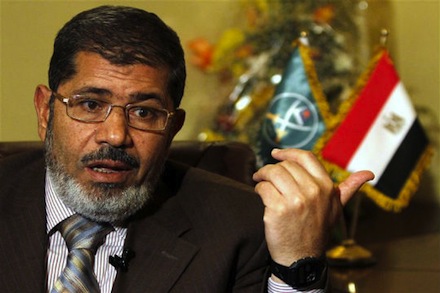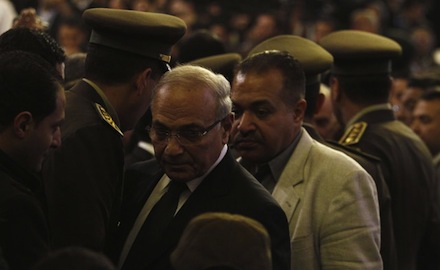So it’s Mohammed Morsi.![]()
Morsi, the candidate of the Muslim Brotherhood, has been elected the first civilian president in the first free and fair elections (presumably) in the modern history of Egypt, which were held last weekend.
I have to say, I was anticipating the fair chance of an announcement of Ahmed Shafiq as the “winner,” notwithstanding the actual vote tally.
Morsi won 51.73% to just 48.27% for Ahmed Shafiq, the former Air Force commander, former Mubarak prime minister and likely favored candidate of the Supreme Council of the Armed Forces, which has been a bit schizophrenic of late, to say the least, in its willingness to hand over power to the Muslim Brotherhood.
The announcement of Morsi’s victory comes after Morsi himself declared victory last Monday in the wake of unofficial counts showing him with a small, but meaningful, lead. It’s still unclear why there’s been a delay in the announcement, which was supposed to come on Thursday.
Of course, Morsi has been elected president without anyone in Egypt knowing what that means. Since no constitution has been drafted, it’s unclear whether Morsi will have any real power or will rather be a figurehead.
In the final hours of voting, however, SCAF announced amendments to the Constitutional Declaration promulgated in March 2011 granting itself the right to assume parliamentary powers, the right to approve the state budget, the right to veto the president’s decisions about declaring war and the right to intrude on the constitution-writing process. On the previous Thursday, the Supreme Constitutional Court invalidated the January 2012 parliamentary elections, thereby suspending Egypt’s short-lived parliament.
The Muslim Brotherhood’s Freedom and Justice Party won 235 of the 508 parliamentary seats (another 121-seat bloc went to the more conservative, Salafist Al-Nour Party).
So with Morsi’s presidential victory, the Muslim Brotherhood would have been in a very strong position to, you know, actually have real power in Egypt. Likely, the prospect of a transition to an Islamist government spooked SCAF, which has clumsily tried to rewrite the rules of the transition to give it a role akin to the Turkish military during much of the 20th century — embedded in the fabric of government (which meant that it continued to benefit from corruption and graft) and “guardian” of the secular nature of the Turkish state (which meant that, until the Erdoğan government in 2003, it would stage a coup upon the election of any Islamist government).
Morsi won 13.23 million votes out of the 26.42 million cast to just 12.35 million for Shafiq. The election commission invalidated over 843,000 votes, less than the total margin of victory for Morsi.
It is now up to Morsi to show that he will be a president for all Egyptians, including the wide swath of pro-revolutionary voters — non-Islamists, secularists, moderates, liberals, nationalists — who supported Morsi as the only option in the face of Shafiq, whose potential election was largely seen as representing a step back to Mubarak-style semi-authoritarianism.
It is also now up to Morsi to work with SCAF to bring some conclusion to the turmoil of recent weeks and bring the transition from Mubarak to democracy (however imperfect) to a more settled conclusion, and to work with SCAF to oversee the re-instating of parliament or new elections for parliament, as well as to oversee the Constituent Assembly that will draft the constitution — before its suspension, the parliament had agreed to a body comprised 50% each of Islamists and non-Islamists.
Khairat al-Shater, the deputy chair of the Muslim Brotherhood, confirmed this week that his group and SCAF were conducting negotiations about the transfer of power. Al-Shater, a popular former businessmen, who is seen as a pragmatic Islamist, was the Brotherhood’s first candidate for president, but was disqualified in April.
Whatever happens, it appears that SCAF, which is supposed to hand over power in a grand June 30 ceremony, will still play a significant role in Egypt’s Morsi era as well as its post-Mubarak era: Continue reading Morsi declared winner of presidential runoff in Egypt





